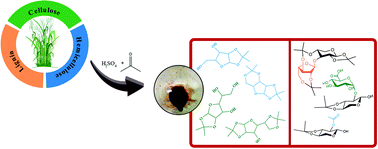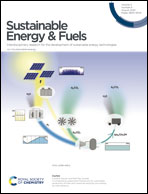Catalytic sugarcane bagasse transformation into a suitable biocrude for hydrocarbon production in typical refinery processes†
Abstract
The conversion of biomass to green hydrocarbons offers great advantages to shorten our path to sustainability. Unfortunately, none of the existing approaches produces a biocrude that is compatible (in terms of density, viscosity, and reactivity) with current refinery processes. In this work, sugarcane bagasse was converted completely to a biocrude rich in O-isopropylidene acetals by an acetalization process using a continuous flow reactor. Hemicellulose is the first component that transformed into acetals followed by amorphous and crystalline cellulose. Hence, the composition of the biocrude to be collected under specific reaction conditions could be tuned in terms of the type of carbohydrate (pentoses and hexoses) and their derivatives. The process was also applied at a larger scale (20-fold increase) to produce a stable biocrude with density ≈1.2 g cm−3, viscosity of 200 cp (60 °C) and specific heat 1.8 J g °C−1 confirming its properties for conversion in typical refinery processes.

- This article is part of the themed collection: Celebrating Latin American Talent in Chemistry


 Please wait while we load your content...
Please wait while we load your content...